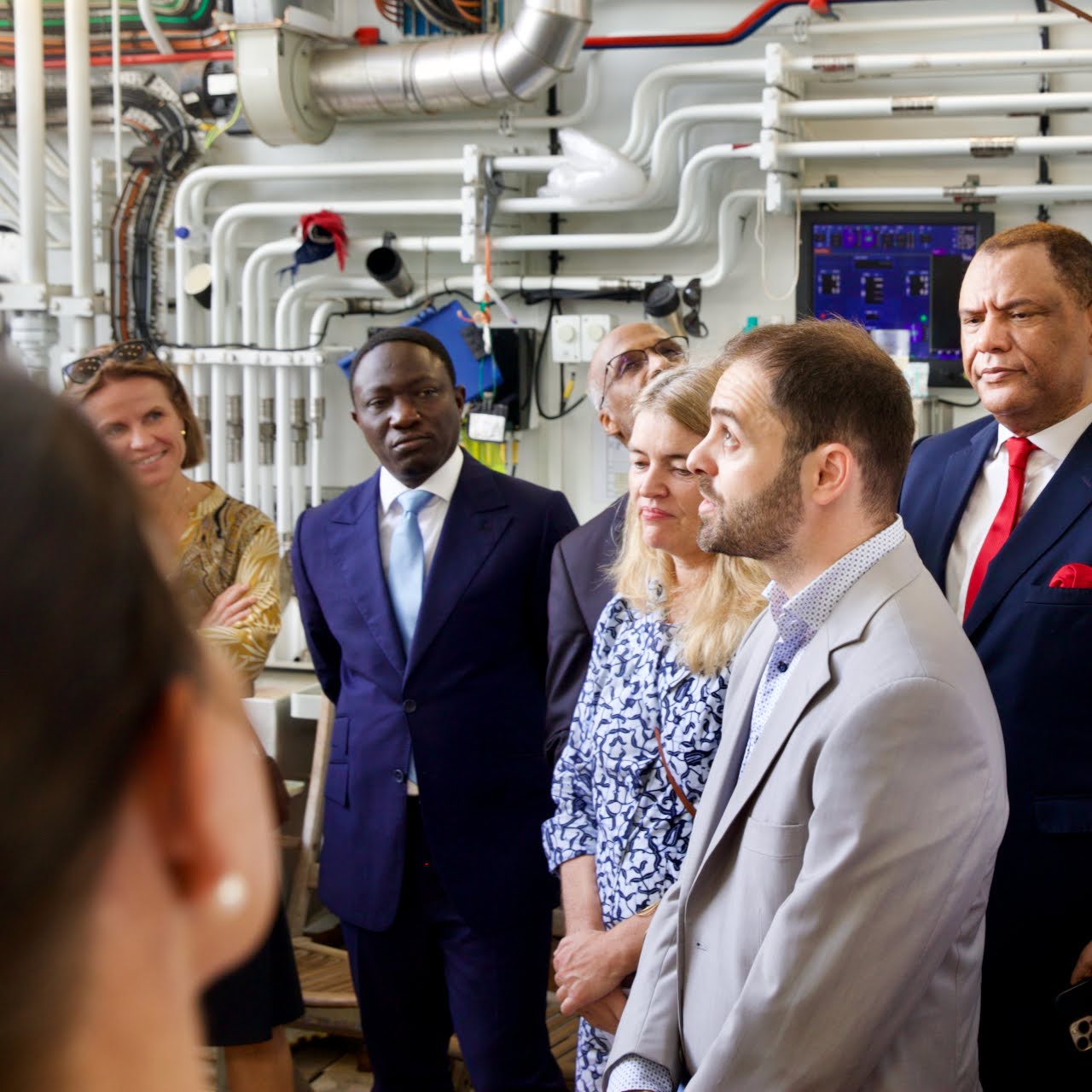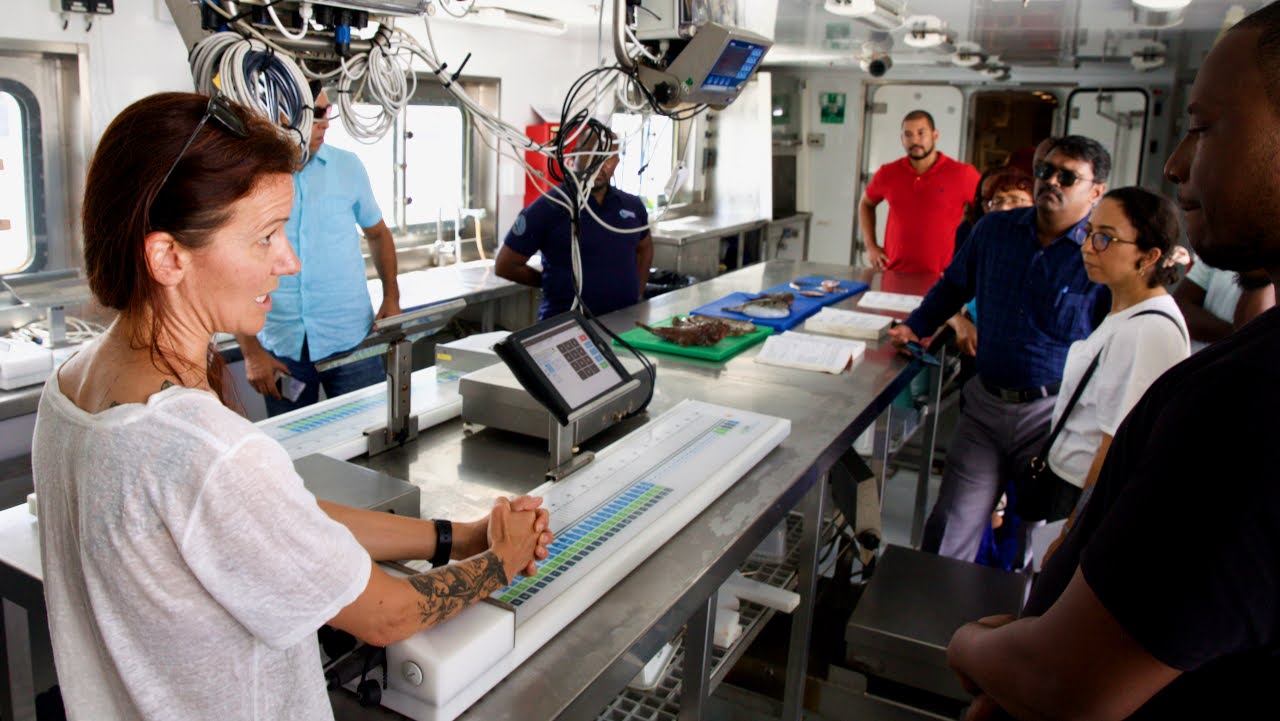The EAF-Nansen Programme hosts event to showcase unique ocean research facilities aboard the research vessel Dr Fridtjof Nansen
|
|
20 October 2022, Dakar, Senegal - Over 90 representatives from the public and private sectors, including development agencies, government officials, regional fisheries organizations, and research institutions, came together at an event in the port of Dakar to take part in a guided tour aboard the renowned research vessel Dr Fridtjof Nansen, before her return to sea to complete a transboundary study of small pelagic fish stocks in the waters off northwest Africa. The event was organized at the end of the EAF-Nansen Programme Forum 2022 to showcase the unique ocean research facilities that have served the partner countries of the Programme for almost five decades.
“In Senegal, the economic and social importance of the fishing sector through its contribution to food security and the creation of wealth and jobs, is well established,” said the Minister of Fisheries and Maritime Economy in Senegal, Mr Papa Sagna Mbaye, who participated in the event alongside the Norwegian State Secretary of the Ministry of Foreign Affairs, Ms Bjørg Sandkjær and the FAO Representative Mr Gouantoueu Robert Gueï. Mr Mbaye was pleased to welcome the vessel back to Senegal and noted that: “The state-of-the-art research vessel Dr Fridtjof Nansen has already carried out several assessments of transboundary stocks and environmental studies for the purpose of generating data to inform policy decisions on the management of these important resources.”
 © IMR/Erik Olsen © IMR/Erik Olsen |
 © IMR/Erik Olsen © IMR/Erik Olsen |
The EAF-Nansen Programme is a longstanding partnership between the Food and Agriculture Organization of the United Nations (FAO) and Norway, dating back to 1975. To date, the Programme has collaborated with 58 countries across Africa, Asia and South America, assisting them in the field of fisheries research and management.
In its present phase (2017-2023), the EAF-Nansen Programme is working with 32 countries from Africa and the Bay of Bengal to support regional and country-specific efforts to improve food and nutrition security and achieve sustainable fisheries management systems. In doing so, the aim is to enhance the scientific and socio-economic knowledge, improve fisheries policies and management in line with the ecosystem approach to fisheries (EAF), and develop the capacity of fisheries research and management institutions to sustainably manage fisheries.
The Dr Fridtjof Nansen is an integral part and important tool of the EAF-Nansen Programme, owned by Norway and operated by the Norwegian Institute of Marine Research (IMR). Hosting seven laboratories equipped with the most recent technology, the vessel is a unique platform for strengthening our knowledge about the ocean. It is also the only research vessel that flies the UN flag, as a sign of neutrality and agreement between the collaborating agencies and member countries of the Programme.
 © IMR/Erik Olsen © IMR/Erik Olsen |
 © IMR/Erik Olsen © IMR/Erik Olsen |
“To achieve sustainable management of the ocean, we need international cooperation and sharing of knowledge between countries. The Nansen Programme delivers both, by providing essential and up-to-date knowledge about the ocean”, said Norwegian State Secretary, Ms Bjørg Sandkjær. “Fish do not know national borders, and neither should our cooperation in managing these vital resources. The programme has proved to be vital for building trust between countries,” Ms Sandkjær added.
Despite an interruption caused by the Covid-19 pandemic in 2020, over 40 000 nautical miles have been sailed and over 600 marine scientists from partner countries, and beyond, have participated in research surveys since the start of the current phase of the Programme in 2017. From assessing fish stocks, to studying different elements of marine ecosystems, including oceanographic conditions, corals, sponges and jellyfish, documenting plastic pollution and contributing to knowledge on climate change and fish food safety, the findings and data generated from the research surveys have added volumes to the understanding of the Ocean.
“The work of the research vessel Dr Fridtjof Nansen is an important part of FAO's support to its member countries. It provides vital information for the management of oceans and marine resources in FAO member countries, especially here in Africa. In many countries, the data and information generated are the only credible assessment data on fisheries resources,” said FAO Representative, Mr Gouantoueu Robert Gueï.
To assist countries in achieving food and nutrition security, the EAF-Nansen Programme is promoting sound fisheries management built on knowledge of the resources in their national waters and regionally. In the northwest part of Africa, collaboration has mainly focused on transboundary small pelagic stocks, which is still today one of the main strengths of regional cooperation.
“Small pelagics are an important resource for food security in northwest Africa, and beyond, and the EAF-Nansen Programme has supported the development of the knowledge base on these important transboundary fish stocks for decades through the surveys by the Dr Fridtjof Nansen,” said Merete Tandstad, Coordinator of the EAF-Nansen Programme, and further explained that the information gathered during the surveys has contributed to the work of FAO and the Fishery Committee for the Eastern Central Atlantic (CECAF) that provides scientific advice on the management of small pelagic stocks to CECAF member countries.
On 22 October, the Dr Fridtjof Nansen is going back to sea to complete the transboundary study of small pelagic fish stocks in the waters off northwest Africa. This survey started in Dakar, Senegal on 5 October 2022, and will end in Las Palmas, Spain on 16 December 2022. 47 national scientists from 5 countries including The Gambia, Mauritania, Morocco, Senegal and Ivory Coast, contribute to this research campaign.
The EAF-Nansen Programme Forum 2022 took place from 18-19 October in Dakar, Senegal, and was organized in collaboration with the Ministry of Fisheries and Maritime Economy in Senegal. It is the third Forum hosted during this phase of the Programme to share experiences, best practices and facilitate discussions on strategies pertaining to the partners of the Programme.
Looking ahead, the next phase of the Programme (2024-28) will continue to build capacities, advance fisheries management and associated scientific knowledge on marine resources and ecosystems, while pursuing the objectives of the UN Decade of Ocean Science for Sustainable Development, as well as FAO’s vision for Blue Transformation of aquatic food systems for better production, better nutrition, a better environment, and a better life for all.
More on the topic:
- Fishery and oceanographic research vessel the R/V Dr Fridtjof Nansen (brochure)
- EAF-Nansen Programme – supporting the application of the ecosystem approach to fisheries management (video)
- EAF-Nansen Programme – Endorsed Ocean Decade Action (fact sheet)
- Norway and FAO launch unique, state-of-the art oceanic research ship (FAO article)

